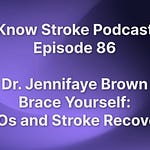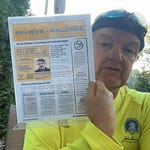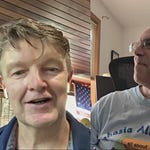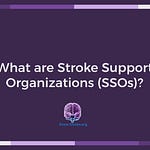Background: Rory and I first met through an introduction from our neurologist in Boston and we became fast friends as we shared similar fitness backgrounds and experiences ‘hacking’ our individual stroke recoveries.
We later had Rory on the Know Stroke Podcast (March 2024 Episode 69). A lot of highs and lows have passed in Rory’s recovery since that episode aired and we wanted to share his lessons learned ‘After the Pod’ over the past year so that it might help you in your own recovery.
I will also be taking a deeper dive into Rory’s story in my upcoming new book Closure After Stroke.
Stay tuned and subscribe here at Know Stroke for those updates and follow our show here or on your favorite podcast player.
Summary
In this conversation, stroke survivors David Dansereau and Rory Polera discuss the journey of stroke recovery, emphasizing the importance of personal experiences, data-driven insights, and the role of technology in rehabilitation.
Rory shares his personal timeline, the challenges he faced, and the tools he used to navigate his recovery. They explore the rising rates of strokes in young adults, the significance of mental health, nutrition, and community support in recovery, and the potential for technology-enabled solutions to enhance stroke rehabilitation outcomes and long term surveillance for secondary prevention.
The discussion highlights the need for greater awareness and accessibility of tech enabled recovery tools for stroke survivors.
Grab a coffee, this one is purposely long, it’s a deep dive into the long journey we all face as survivors and the gems you will learn from Rory are priceless!-David
Takeaways
You don't have to be an engineer or physical therapist to recover from a stroke.
Conducting an ethnography of oneself can aid recovery.
Young stroke occurrence rates are rising alarmingly and we need to explore new recovery pathways that resonate with their unique needs.
Recovery doesn't stop at discharge; it's a continuous journey.
Mental health is critical at every phase of recovery.
Embracing the technicalities of recovery can empower individuals.
Data can provide valuable insights into recovery progress.
The choice to engage with technology is yours and this is a case study on how this choice can enhance recovery.
Community support plays a vital role in recovery.
The future of stroke recovery lies in integrating technology and personal experiences with a supportive stroke community.
Some of my Favorite Sound Bites from My Discussion with Rory!
"Data doesn't lie."
"This is a learning lab for me."
"Recovery doesn't stop at discharge."
“I’m still recalibrating a new normal after my stroke”.
Chapters
These chapters will be marked for easier access once this episode is indexed and we have uploaded the transcript. We’ll also make available on our YouTube channel for sharing.
Introduction by David and Rory and Context Setting
The Journey of Stroke Recovery
Understanding the Rise of Young Strokes
Personal Timeline and Milestones
Technology's Role in Recovery
Building a Supportive Environment
Fitness and Adaptive Programs
Navigating Parenthood Post-Stroke
Nutrition's Impact on Recovery
Understanding Blood Sugar Extremes and Mental Health
The Importance of Tracking Recovery Milestones
Integrating Technology in Rehabilitation
The Role of Data in Stroke Recovery
Nutrition Timing and Its Impact on Recovery
The Future of Wearable Technology in Health
Lessons Learned from Recovery Experiences
Call to Action for Tech and Industry Leaders to Step Up, Innovate for Stroke, and Include Survivor Experiences in All Phases of Development and Deployment.
Next Steps
Keywords and Technology Terms
stroke recovery, technology, mental health, data-driven insights, personal journey, community support, nutrition, fitness, wearable devices, emotional resilience, lived-experience. Medical Terms: DHT (digital health technologies), CGM (Continuous Glucose Monitor), CPAP (Continuous Positive Air Pressure).
Company mentions:
Oura, Apple Watch, Stelo, iHealth, Kardia Mobile, Fit-to-Function (FtF), Dexcom, CGM and much much more!















